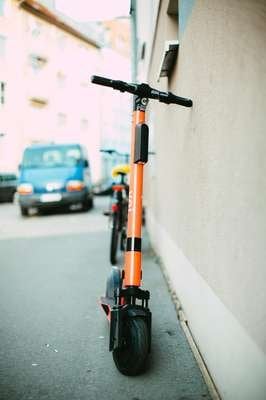Local government to implement new rules for electric vehicles after startling statistic
By
Danielle F.
- Replies 23
In recent years, the convenience and eco-friendliness of electric mobility devices have seen their popularity soar across New South Wales.
However, with this surge in demand, there's been an alarming increase in fires due to batteries that power these devices.
It's a concerning trend that has prompted the NSW government to take decisive action to protect consumers and their properties.
Lithium-ion batteries have been standard, as they are found in daily devices like mobile phones and laptops.
When it comes to mobility devices such as e-bikes and e-scooters, the quality of these batteries is paramount.
Unfortunately, not all batteries are created equal, and these low-quality lithium-ion batteries led to a spike in fire incidents across NSW, with a reported average of one fire every four days.
This is a staggering statistic that cannot be ignored, especially considering the tragic event north of Sydney, where a battery explosion claimed two lives.
NSW Fair Trading Minister Anoulack Chanthivong highlighted the urgency of the situation.
'We are acting ahead of other jurisdictions because unregulated products are posing a huge risk to property and, in some cases, lives,' Chanthivong shared.
With this, the NSW government will have a new regulatory regime that will start in February of next year.
Under this new regime, electric products sold in NSW need to be thoroughly tested and should adhere to internationally accepted product standards.
This means consumers can now have greater confidence in the safety of the e-mobility devices they purchase.
The implementation of new testing, certification, and labelling requirements will be rolled out in stages, ensuring a smooth transition for manufacturers and retailers.
Peter Bourke, the General Manager of Bicycle Industries Australia, pointed out that these devices offer solutions that improve health, reduce traffic congestion and emissions, and are often quicker for commutes.
The industry supported the NSW government's move towards higher quality standards.
They recognised that while the majority of products on the market are safe, it's crucial to eliminate the risk posed by substandard batteries.
The consequences of not complying with these new standards are severe.
Sellers who fail to meet the required quality standards could face penalties of up to $825,000.
This serves as a solid deterrent to ensure the safety of consumers and their homes.
As we embrace modern technology and the benefits it brings, we must also be aware of its potential risks.
It's essential to stay informed about the products we bring into our homes and to support regulations that promote safety and quality.
By staying informed and choosing certified, high-quality products, we can all enjoy the benefits of modern technology without compromising our well-being.

Have you or someone you know been affected by a battery-related incident? What measures do you take to ensure the safety of your electronic devices? Please share your thoughts and experiences with e-mobility devices with us in the comments below.
However, with this surge in demand, there's been an alarming increase in fires due to batteries that power these devices.
It's a concerning trend that has prompted the NSW government to take decisive action to protect consumers and their properties.
Lithium-ion batteries have been standard, as they are found in daily devices like mobile phones and laptops.
When it comes to mobility devices such as e-bikes and e-scooters, the quality of these batteries is paramount.
Unfortunately, not all batteries are created equal, and these low-quality lithium-ion batteries led to a spike in fire incidents across NSW, with a reported average of one fire every four days.
This is a staggering statistic that cannot be ignored, especially considering the tragic event north of Sydney, where a battery explosion claimed two lives.
NSW Fair Trading Minister Anoulack Chanthivong highlighted the urgency of the situation.
'We are acting ahead of other jurisdictions because unregulated products are posing a huge risk to property and, in some cases, lives,' Chanthivong shared.
With this, the NSW government will have a new regulatory regime that will start in February of next year.
Under this new regime, electric products sold in NSW need to be thoroughly tested and should adhere to internationally accepted product standards.
This means consumers can now have greater confidence in the safety of the e-mobility devices they purchase.
The implementation of new testing, certification, and labelling requirements will be rolled out in stages, ensuring a smooth transition for manufacturers and retailers.
Peter Bourke, the General Manager of Bicycle Industries Australia, pointed out that these devices offer solutions that improve health, reduce traffic congestion and emissions, and are often quicker for commutes.
The industry supported the NSW government's move towards higher quality standards.
They recognised that while the majority of products on the market are safe, it's crucial to eliminate the risk posed by substandard batteries.
The consequences of not complying with these new standards are severe.
Sellers who fail to meet the required quality standards could face penalties of up to $825,000.
This serves as a solid deterrent to ensure the safety of consumers and their homes.
As we embrace modern technology and the benefits it brings, we must also be aware of its potential risks.
It's essential to stay informed about the products we bring into our homes and to support regulations that promote safety and quality.
By staying informed and choosing certified, high-quality products, we can all enjoy the benefits of modern technology without compromising our well-being.
Key Takeaways
- The NSW government saw a significant increase in lithium-ion battery-related fires, prompting a crackdown on battery safety standards.
- The NSW government will introduce a new regime by February 2025, requiring products to meet international standards and be tested and certified before being sold.
- New testing, certification, and labelling requirements will be implemented gradually to improve the safety of e-mobility devices like e-bikes and e-scooters.
- Sellers in NSW who fail to comply with the new battery standards could face penalties of up to $825,000.








